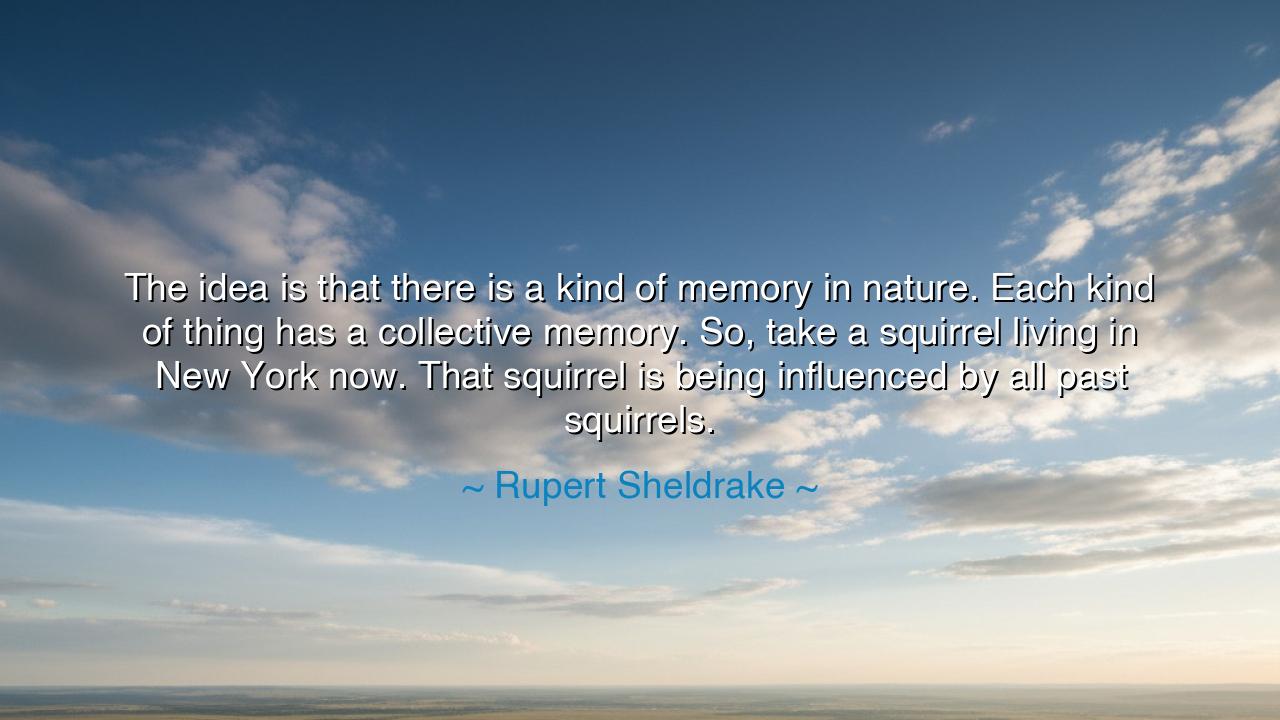
The idea is that there is a kind of memory in nature. Each kind
The idea is that there is a kind of memory in nature. Each kind of thing has a collective memory. So, take a squirrel living in New York now. That squirrel is being influenced by all past squirrels.






Hear, O children of wonder, the daring words of Rupert Sheldrake: “The idea is that there is a kind of memory in nature. Each kind of thing has a collective memory. So, take a squirrel living in New York now. That squirrel is being influenced by all past squirrels.” In these words lies a vision not confined to books of science alone, but to the deep mystery of existence itself. For he speaks of memory, not only in the mind of man, but woven into the very fabric of nature—a memory that shapes life, growth, and instinct across the ages.
What is this collective memory but the invisible river of knowledge flowing from the past into the present? It is the reason the bird builds its nest though never taught, the reason the spider spins its web with perfect form, the reason the child of today is born with countless unspoken patterns. Sheldrake names this great law of remembrance: that each creature carries not only its own life, but the inheritance of all that came before. To live is to draw from the library of time, written not in books, but in the essence of being.
Consider the squirrel of which he speaks. Born in the bustling heart of New York, it has never seen the forests of its ancestors, never watched its kind bury acorns for the long winter. Yet still it digs, still it gathers, still it hides its treasure beneath the soil. How can this be, unless the memory of countless squirrels whispers within it? The creature is taught not by one teacher, but by the lineage of all who lived before. Thus, even the smallest life reveals the truth of collective inheritance.
History, too, gives us examples of such mystery among humankind. Think of the Polynesian navigators, who crossed vast oceans guided only by stars, waves, and winds. Many had never seen the islands they would reach, yet they trusted the instincts and traditions handed down through generations. It was not written maps that guided them, but the memory of their ancestors, alive within ritual, practice, and intuition. Their journeys echo Sheldrake’s vision: that the past continues to live, shaping the present in unseen ways.
The lesson here is profound: you are never alone, never empty. Within you stirs not only your own mind, but the wisdom, the habits, the triumphs and errors of those who came before you. Your courage is linked to the courage of your forebears, your fears may be their unhealed echoes, your strengths their gifts. To understand yourself is also to honor the collective memory of your people, your family, your species. You are not a solitary wave, but part of an eternal ocean.
Practical wisdom follows: live with awareness that your actions, too, become part of this memory. What you do today shapes the path of tomorrow’s children, as the choices of the past shaped you. If you act with kindness, you strengthen the chain of compassion; if you live with cruelty, you deepen the shadow passed to those who come after. Thus, you are both heir and ancestor—receiver of memory, and giver of it.
So, O children of tomorrow, carry Sheldrake’s vision as a mantle: nature remembers. The squirrel in New York carries the forests of its fathers. The bird in flight carries the song of its kind. And you, too, carry within you the memory of humanity. Honor it, deepen it, and pass it on with wisdom. For in the end, life is not a collection of separate sparks, but one great fire, burning across the ages, fed by the wood of all who lived before.






AAdministratorAdministrator
Welcome, honored guests. Please leave a comment, we will respond soon